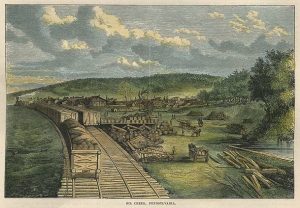Do you have that one ancestor who doesn’t seem to have much of a story?
- The one who stayed in one locale for a lifetime.
- The one whose branch of your tree is eclipsed by more-fascinating parents or children.
- The one who just isn’t very interesting.
I thought so too. Meet R. D. Witter.
Whitening by Witter
Like last Saturday’s look at the Rude family name, Witter seems to derive from multiple sources. According to the Internet Surname Database, the Old English to Middle English etymologies signify “white”–either a bleacher or whitewasher or a white-leather dresser. Ancestry bears out the former from the Middle Low German etymology (witten, i.e., to make white), which would refer to a painter or plaster. An occupational surname in either case, though the launderers, painters or leatherworkers passed out of memory and into legend at least six generations before Rufus David Witter (1841-1905) came on the scene.
Tweetable: R. D. Witter: Solid, Dependable, Boring…?
Every Federal census from 1860 until the end of his life enumerates R. D. Witter in Cattaraugus county, New York. His name turned up in juror lists and Decoration Day committees, and he served as president of the Witter’s family organization which held reunions every year. Like his father-in-law, C. W. Rude, he was a civic-minded man, firmly established in Hinsdale, the town where his parents settled when he was 14 years old.
However, I find two records that don’t quite fit this staid story. R. D. Witter’s name appears on two tax lists, one from July 1865 and another from May 1866, in Oil City, Venango, Pennsylvania. The first calls him a retail dealer, the second, a peddler.
Tweetable: The records beg the question–what did he want in Oil City PA?
The April 7, 1864 edition of The Alleghenian gives us a snapshot of his time and world. (Though the original contains only two paragraphs, I’ve broken it up for easier reading.)
“The editor of the Oil City Register, in closing the second volume of his weekly publication, thus refers to the improvements which have taken place in that vicinity within a short period:
It is now over two years since we first arrived in Oil City, with our press and materials, after a tedious journey in mid winter, over almost impassible roads, from Kittanning to this place. Oil City was then a town in the wilderness, consisting of little else than board shanties. The present immense Petroleum business was but fairly commencing.
With the first issue of the Oil City Register, our citizens organized a borough, and laid the foundation of the present flourishing city. The contrast between now and then is so great as to almost appear incredible. In these two short years the export of Petroleum to foreign countries has increased from about 7,000,000 to 28,000,000 gallons.
The home consumption has increased in like ratio. Oil City now numbers between four and five thousand inhabitants. Along the valley of Oil Creek, for a distance of twelve miles, an almost continuous town has sprung up as if by magic. We estimate the entire populations of Oil City and Oil Creek at from 12,000 to 15,000, which is daily increasing by fresh arrivals.
Two railroads tapping the Oil Region have been built, and several more are projected and under course of completion to this point. The marine fleet engaged in the oil trade has averaged about 500 oil boats and barges, besides some fifteen steamers. In a busy season, even this immense means of transportation has been found inadequate to the great and growing Petroleum trade.
There are now seventy-six refineries in this collectioned district, with an average capacity of from ten to three hundred barrels per day, and many more are building. Blocks of stylish and substantial dwellings and business houses now line our principal streets; one church has been built, and two more are in course of construction, as well as a commodious school house. From one well has been realized, so we are authentically informed, $1,000,000 during the past season.”
Tweetable: Show me the money, honey!
So around age 24, R. D. Witter struck out on his own to find his fortune. On May 1, 1867, he married Anna Elizabeth Keller Rude (1843-1932) of Cuba, New York, suggesting (though not proving) that he returned home by that time. They made their home in Cattaraugus county, first in Portville and then back to Hinsdale.
I like to imagine he knew her before he left for Oil City. It’s more than possible; before they settled in Hinsdale, the Witters lived in Allegany county New York, not too far from the Kellers and Rudes. Maybe he went away to earn her hand. Maybe he promised to come back for her…
Ah. I’m such a romantic, I know.
Not so boring after all….
If you have a few “Old Reliables” in your tree, ancestors who seemed to live their whole lives in the same one-horse town, keep digging. Ten years between censuses is a long time.
I’ll bet they have secret stories too.






There’s always something more to learn about our family!